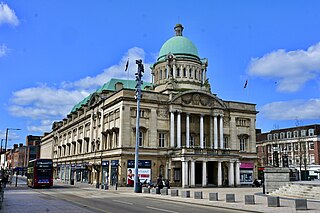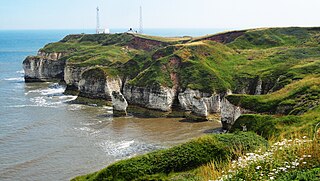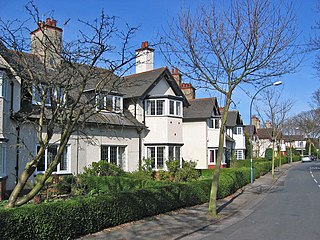
Kingston upon Hull, usually shortened to Hull, is a port city and unitary authority area in the East Riding of Yorkshire, England. It lies upon the River Hull at its confluence with the Humber Estuary, 25 miles (40 km) inland from the North Sea and 37 miles (60 km) south-east of York, the historic county town. With a population of 268,852 (2022), it is the fourth-largest city in the Yorkshire and the Humber region after Leeds, Sheffield and Bradford.

Beverley is a market town and civil parish in the East Riding of Yorkshire, England. It is located 27 miles (43 km) south-east of York and 9 miles (14 km) north-west of Hull. At the 2021 census the built-up area of the town had a population of 30,930, and the smaller civil parish had a population of 18,014. It is the county town of the East Riding of Yorkshire.

The East Riding of Yorkshire, often abbreviated to the East Riding or East Yorkshire, is a ceremonial county in the Yorkshire and the Humber region of England. It borders North Yorkshire to the north and west, South Yorkshire to the south-west, and Lincolnshire to the south across the Humber Estuary. The city of Kingston upon Hull is the largest settlement.

The Hull Daily Mail is an English regional daily newspaper for Kingston upon Hull, in the East Riding of Yorkshire. The Hull Daily Mail has been circulated in various guises since 1885. A second edition, the East Riding Mail, covers East Yorkshire outside the city of Hull. The paper publishes everyday except Sunday.

The Birmingham Blitz was the heavy bombing by the Nazi German Luftwaffe of the city of Birmingham and surrounding towns in central England, beginning on 9 August 1940 as a fraction of the greater Blitz, which was part of the Battle of Britain; and ending on 23 April 1943. Situated in the Midlands, Birmingham, the most populous British city outside London, was considered an important industrial and manufacturing location. Around 1,852 tons of bombs were dropped on Birmingham, making it the third most heavily bombed city in the United Kingdom in the Second World War, behind London and Liverpool.

Beverley Road is one of several major roads that run out of the city of Hull in the East Riding of Yorkshire, England. The road is noted for being a major arterial route into, and out of Hull. It also known for its student population and being the location of a shop (Turners), whose slogan was used by the pop band, Everything But the Girl. In 1994, just over 1-mile (1.6 km) of the road was designated as a conservation area.

Endeavour Learning and Skills Centre is a centre operated by Hull Training & Adult Education offering adult education and further education.

Drypool is an area within the city of Kingston upon Hull, England.

The Hull Blitz was the bombing campaign that targeted the English port city of Kingston upon Hull by the German Luftwaffe during the Second World War.

Newland School For Girls is a secondary school for girls aged 11– 16, situated in the Newland area of Kingston upon Hull, England.

Larkin 25 was an arts festival and cultural event in Kingston upon Hull, England, organised to mark the 25th anniversary of the death of the poet and University of Hull librarian, Philip Larkin. The festival was launched at Hull Truck Theatre on 14 June 2010 and concluded on 2 December 2010, the twenty-fifth anniversary of the poet's death, with the unveiling of a statue in his likeness at Hull Paragon Interchange.

Anlaby Road is a major arterial road and residential district in west Hull, East Riding of Yorkshire in the north of England. It runs west from the city centre to the city boundary, designated A1105 to its junction with Boothferry Road and then B1231 from there to the city boundary.

Newland is a suburb of Kingston upon Hull, East Riding of Yorkshire, England, in the north-west of the city, a former village on the Hull to Beverley turnpike.

In 1898 William Morton's Theatre Royal showed a 'Veriscope' film, probably the first time any film was shown in a Hull theatre. The Prince's Hall was the first purpose-built cinema in Kingston upon Hull, and was opened in George Street by Morton in 1910. As Hull embraced the new age of public entertainment, attendances at traditional theatre declined. Luxurious cinemas, taking their inspiration from theatres and music halls, were built to accommodate audiences in almost every neighbourhood in the city. By 1914, there were 29 cinemas, theatres and halls showing films in the city. The London and Provincial Cinema Company owned the Hippodrome; the National Electric Picture Theatres owned the Theatre de Luxe, but Morton's was the largest and most influential cinema chain in Hull.

The Garden Village is an area of model village housing built in the early 1900s, in the Summergangs area of Kingston upon Hull, England, for the workers of Reckitt & Sons.

Stepney is an area of Kingston upon Hull within the larger area of Sculcoates, north of the city centre on the (A1079) Beverley-Hull main road. Before the mid-19th century the place was a small hamlet outside the urban area of Kingston upon Hull.

Southcoates is an urban area in the eastern part of Kingston upon Hull, England.

The Edwin Davis Company was a department store based in Kingston upon Hull that traded from around 1840 until 1978.

Kingston upon Hull, on England's East Coast was, by 1750, a major point of entry into Britain for traders and migrants, second only to London for links to the continent. Around then, a few Jews from German and Dutch cities lodged and settled in Hull. Selling jewelry and dealing goods in the thriving port and market town, they maintained contacts with Europe, London, and many other – particularly Northern – towns. The small community produced its own institutions and leaders, which were tested by anti-Jewish sentiment, and later by an influx of East-European refugees.

Whitefriargate is a pedestrianised street in the Old Town area of Kingston upon Hull, in the East Riding of Yorkshire, England. During the 20th century, it was one of the main shopping streets in the city centre, but some of the major stores have closed down, which has been attributed to out of town shopping centres. However, the Street still provides a useful link to and from the old town of Hull.



















